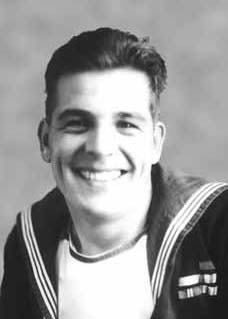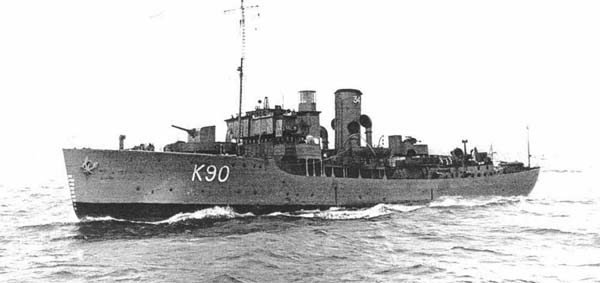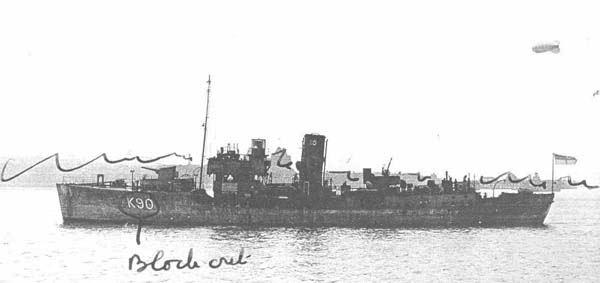 Signalman
Denis Davies: Recollections of HMS Gentian Signalman
Denis Davies: Recollections of HMS Gentian
[Note: The following is courtesy of Denis' son Peter and concerns his
fathers time at sea on HMS Gentian]
The first two trips were uneventful, apart from a few submarine scares.
We arrived in Boston eight weeks after leaving Liverpool. We always seemed
to be stuck with the oldest and slowest ships in our convoys - 3 knots
flat out - and we were zigzagging all the way. Hence the reason for the
long journey.
These Corvettes were really hell ships. After three days at sea, there
was no tucker - just ships biscuits and a tin of marmalade, the ingredients
of which were very dubious. We were only allowed two cups of water per
day (perhaps) providing that the water distiller was working. The name
of the ship incidentally was "HMS Gentian". It was part of the B2 escort
group, under the control of the group leader "Hesperus", which was a destroyer
commanded by Cmdr D. McKintyre, a fearless man with a flowing red beard
and, at that time, the youngest and most decorated commander in the Royal
Navy. He was a bloody good bloke.
Our third trip proved to be the complete opposite of the preceding
two. We had hardly left the Irish coastline when the convoy came under
a heavy and sustained attack from a U-Boat pack. Ships were darting everywhere,
and confusion reigned supreme.
We, with the rest of the escorts, were busy trying to herd the merchantmen
back into their stations. We were all firing death charges like confetti,
but only managed to disturb the water. Hesperus did manage to get a U-Boat
and after that, it quietened down and we all carried on doing our business
in great waters.

Once in Newfoundland, where the Canadian Navy took over to take the
convoy into Boston we were able to relax, have a shower, haircut and a
decent feed - a whole week of heavenly bliss until the homeward-bound
convoy came in. We then took over from the Canadians, and brought them
all safely back to Liverpool. It only took six weeks, being a much faster
convoy - 10 knots - then into dock for a boiler clean, which was necessary
after each trip.
Half the crew would get a weeks leave. This was an alternative arrangement
because, after the next trip, the other half would get leave. The only
snag was that if you or I wanted to go home, you had to pay your own fare
and 10/- per week does not run to that, although we had over three months
pay, because we weren't paid at sea - just an advance at Boston. I had
to content myself with a booking in the Salvation Army or YMCA services
clubs and enjoy the pleasant hospitality that both Lime Street or Dale
Street had to offer. Also, the train service was so erratic, there was
no certainly that we would get home or get back again and it would have
taken two days travelling.
We were all ready to sail again after 9-10 days. The first night was
relatively calm; slight wind and a moderate swell. Alas those condition
lasted only until the following afternoon and then, all hell broke loose.
Not, I hasten to say through the enemy, but from the elements. I couldn't
believe it. The rapidity of the change!
Our first inkling of what was to come was a terrific lurch to port
that sent everything flying to that side, including all of us on the bridge.
We must have going almost 90 degrees because the port guns were awash.
We were all horizontal and found it difficult to get to our feet. However
after what seemed an eternity the ship righted itself and got its keel
back into the water. The wind, meanwhile, had intensified and was howling
at typhoon force. I could not keep my eyes open. Then another crash and
over we went again.
It was impossible to see the convoy or any of the other escorts; just
a solid mountain of water and pitch dark, even though it was only late
afternoon. These conditions prevailed for the next few days, then it worsened.
I was in my action station in the crows nest, and having the ride of
a lifetime. There was an empty tobacco tin up there as an ashtray and,
believe it or not, I managed to fill it with sea water as we did a heavy
roll to starboard. I swear it was over 90 degrees. I thought "This is
it. She ain't gonna come back from this!" I prepared to slide out of the
crows nest and into the water, although I did not relish the thought of
going into that raging torrent, but she, (the ship) shuddered for a while
then, oh so slowly started to come back. That was when I filled the tin.
It took what seemed ages to get back on an even keel, although it was
over in five minutes. Hell-ships they may have been, but they were really
sea worthy. The worst was still to come.

We were battered, blown and storm-tossed for a further three days then
came the big one. I was again on the starboard side of the open bridge
when we copped a beauty. It almost turned us right over. I crashed across
to the port side, smashing into the binnacle on the way and cutting my
head badly, and finished up a crumpled, bloodstained heap with the officer-of-the-watch,
and couldn't seem to function at all. Blood was all over my oilskins and
the sou-wester was full of water - only it was red. I had no tin hat on,
as we were not at action stations. A sou-wester was not designed to withstand
the impact of a brass binnacle.
At first, I thought we had been torpedoed, but I was slowly loosing
consciousness. The next thing I remember was that I was in my hammock
with my head swathed in bandages, like a Punjabi! We carried no doctor
of course and we couldn't transfer me to 'Hersperus', who did have one,
and they could not put him on board 'Gentian', so the treatment was prescribed
by signal. I recovered somewhat and, as we only had three signalman in
the crew, I felt obliged to resume duties, although I was far from well,
but the other two were keeping watches of 4 hours on and 4 off.
By this time, the poor old 'Gentian' was buggered. It was a complete
shambles. All our lifeboats and carley floats had disappeared. The lifelines
we had rigged were bobbing about somewhere in the Atlantic. The guns on
either side of the bridge had broken loose from their mounts, and were
dancing two and fro with every roll and pitch of the ship, banging against
the bulkheads. I felt sure that they were trying to get together for a
do-se-doh. However, the upshot of it all was that we were stuffed.
We had only been at sea for a month, then the captain requested, and
received, permission to go to the nearest Port because - and I quote his
signal - "We reached the prudent limit of human endurance". We made for
Ponta Delgado, in the Azores, which was a neutral port, where we were
allowed 48 hours to effect whatever repairs we could. I was taken to the
only hospital, where I was patched up a bit.
We managed to find an old cutter, which we took for our only lifeboat.
I think it was the first one ever made, and had not been painted or repaired
in that time. However, the Royal Navy, as always, had plenty of read-lead
paint and also battleship grey and, after plugging all the holes, and
18 coats of each paint, she looked sea-worthy. Thank Christ we never had
to prove it. We also managed to pinch some food (mainly onions, which
I did then, and still do hate) some bread and some fresh water, so we
lived liked kings for a day. We sailed after our time was up, and tried
to catch up the convoy. The dancing guns had been chocked and made more
or less secure, and we prayed that the weather, comprising of tempest,
tornado and typhoon, all encapsulated, had settled down a bit, which although
it wasn't good, it was certainly better than the previous four weeks.
|
 Signalman
Denis Davies: Recollections of HMS Gentian
Signalman
Denis Davies: Recollections of HMS Gentian
